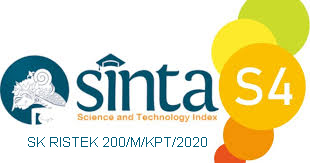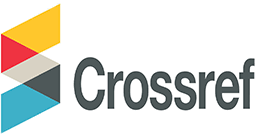Optimization of Extreme Programming Methods in Plastics Waste Management Company Websites
Abstract
Plastic waste needs to be handled properly according to its type to reduce its negative impact on the earth, such as the issue of global warming which is still being widely discussed among the public. Good and correct plastic waste management has a significant long-term impact on the issue of global warming. Using the optimization of the extreme programming (XP) method to develop a plastic waste management system. With the system development method used, namely extreme programming, this system helps the community to be aware of waste and manage waste as well and wisely as possible. Extreme programming flexibility supports all changes that occur during the process of building this plastic waste management system. The output produced in the construction of this system is the management and sale of plastic waste that can be recycled according to its type. With usability testing that has been carried out, this system has been evaluated and shows a result of 88.07%, this value means that the plastic waste management system is well accepted to be used in plastic waste management.
Keywords
Full Text:
PDFReferences
Zhang, H., Pap, S., Taggart, M. A., Boyd, K. G., James, N. A., & Gibb, S. W. (2019). A review of the potential utilisation of plastic waste as adsorbent for removal of hazardous priority contaminants from aqueous environments. Environmental Pollution, xxxx, 113698. https://doi.org/10.1016/j.envpol.2019.113698
Li, X., Ling, T. C., & Hung Mo, K. (2020). Functions and impacts of plastic/rubber wastes as eco-friendly aggregate in concrete – A review. Construction and Building Materials, 240, 117869. https://doi.org/10.1016/j.conbuildmat.2019.117869
Anuar Sharuddin, S. D., Abnisa, F., Wan Daud, W. M. A., & Aroua, M. K. (2016). A review on pyrolysis of plastic wastes. Energy Conversion and Management, 115, 308–326. https://doi.org/10.1016/j.enconman.2016.02.037
Kaliyavaradhan, S. K., Ling, T. C., Guo, M. Z., & Mo, K. H. (2019). Waste resources recycling in controlled low-strength material (CLSM): A critical review on plastic properties. Journal of Environmental Management, 241(December 2018), 383–396. https://doi.org/10.1016/j.jenvman.2019.03.017
Li, W. C., Tse, H. F., & Fok, L. (2016). Plastic waste in the marine environment: A review of sources, occurrence and effects. Science of the Total Environment, 566–567, 333–349. https://doi.org/10.1016/j.scitotenv.2016.05.084
Mwanza, B. G., & Mbohwa, C. (2017). Drivers to Sustainable Plastic Solid Waste Recycling: A Review. Procedia Manufacturing, 8(October 2016), 649–656. https://doi.org/10.1016/j.promfg.2017.02.083
Wedayani, N. M. (2018). Studi Pengelolaan Sampah Plastik Di Pantai Kuta Sebagai Bahan Bakar Minyak. Jurnal Presipitasi : Media Komunikasi Dan Pengembangan Teknik Lingkungan, 15(2), 122. https://doi.org/10.14710/presipitasi.v15i2.122-126
Moharir, R. V., & Kumar, S. (2019). Challenges associated with plastic waste disposal and allied microbial routes for its effective degradation: A comprehensive review. Journal of Cleaner Production, 208, 65–76. https://doi.org/10.1016/j.jclepro.2018.10.059
Wu, G., Li, J., & Xu, Z. (2013). Triboelectrostatic separation for granular plastic waste recycling: A review. Waste Management, 33(3), 585–597. https://doi.org/10.1016/j.wasman.2012.10.014
Miandad, R., Barakat, M. A., Aburiazaiza, A. S., Rehan, M., & Nizami, A. S. (2016). Catalytic pyrolysis of plastic waste: A review. Process Safety and Environmental Protection, 102, 822–838. https://doi.org/10.1016/j.psep.2016.06.022
Al-Harahsheh, M., Al-Nu’Airat, J., Al-Otoom, A., Al-Hammouri, I., Al-Jabali, H., Al-Zoubi, M., & Abu Al’Asal, S. (2019). Treatments of electric arc furnace dust and halogenated plastic wastes: A review. Journal of Environmental Chemical Engineering, 7(1), 102856. https://doi.org/10.1016/j.jece.2018.102856
A., G. K., K., A., M., H., K., S., & G., D. (2019). Review on plastic wastes in marine environment – Biodegradation and biotechnological solutions. Marine Pollution Bulletin, May, 110733. https://doi.org/10.1016/J.MARPOLBUL.2019.110733
Saleem, J., Adil Riaz, M., & Gordon, M. (2018). Oil sorbents from plastic wastes and polymers: A review. Journal of Hazardous Materials, 341, 424–437. https://doi.org/10.1016/j.jhazmat.2017.07.072
Horodytska, O., Valdés, F. J., & Fullana, A. (2018). Plastic flexible films waste management – A state of art review. Waste Management, 77, 413–425. https://doi.org/10.1016/j.wasman.2018.04.023
Tolfo, C., & Wazlawick, R. S. (2008). The influence of organizational culture on the adoption of extreme programming. Journal of Systems and Software, 81(11), 1955–1967. https://doi.org/10.1016/j.jss.2008.01.014
Schneider, J. G., & Johnston, L. (2005). eXtreme Programming - Helpful or harmful in educating undergraduates? Journal of Systems and Software, 74(2 SPEC. ISS.), 121–132. https://doi.org/10.1016/j.jss.2003.09.025
Supriyatna, A. (2018). Metode Extreme Programming Pada Pembangunan Web Aplikasi Seleksi Peserta Pelatihan Kerja. Jurnal Teknik Informatika, 11(1), 1–18. https://doi.org/10.15408/jti.v11i1.6628
Azdy, R. A., & Rini, A. (2018). Penerapan Extreme Programming dalam Membangun Aplikasi Pengaduan Layanan Pelanggan (PaLaPa) pada Perguruan Tinggi. Jurnal Teknologi Informasi Dan Ilmu Komputer, 5(2), 197. https://doi.org/10.25126/jtiik.201852658
Gumelar, T., Astuti, R., & Sunarni, A. T. (2017). Sistem Penjualan Online Dengan Metode Extreme Programming. Jurnal Telematika, 9(2), 87–90.
Anwer, F., & Aftab, S. (2017). SXP: Simplified Extreme Programing Process Model. International Journal of Modern Education and Computer Science, 9(6), 25–31. https://doi.org/10.5815/ijmecs.2017.06.04
Wanti, L. P., Ikhtiagung, G. N., & Pangestu, I. A. (2021). Implementasi Extreme programming Pada Website Marketplace Lapak Petani Online. 12(01), 50–58. https://doi.org/10.35970/infotekmesin.v12i1.427
Fojtik, R. (2011). Extreme programming in development of specific software. Procedia Computer Science, 3, 1464–1468. https://doi.org/10.1016/j.procs.2011.01.032
Rahmi, R., Sari, R., & Suhatman, R. (2016). Pendekatan Metodologi Extreme Programming pada Aplikasi E-Commerce (Studi Kasus Sistem Informasi Penjualan Alat-alat Telekomunikasi). Jurnal Komputer Terapan, 2(2), 83–92.
Roky, H., & Meriouh, Y. Al. (2015). Evaluation by Users of an Industrial Information System (XPPS) Based on the DeLone and McLean Model for IS Success. Procedia Economics and Finance, 26(0), 903–913. https://doi.org/10.1016/s2212-5671(15)00903-x
Tabassum, A., Manzoor, I., Shahid, D., Rida, A., & Imtiaz, D. (2017). Optimized Quality Model for Agile Development: Extreme Programming (XP) as a Case Scenario. International Journal of Advanced Computer Science and Applications, 8(4), 392–400. https://doi.org/10.14569/ijacsa.2017.080453
Anwer, F., Aftab, S., Shah, S., & Waheed, U. (2017). Comparative analysis of two popular agile process models: extreme programming and scrum. International Journal of Computer Science and Telecommunications, 8(2), 1–7.
Doerfler, R. M., Diamantidis, C. J., Wagner, L. A., Scism, B. M., Vaughn-Cooke, M., Fink, W. J., Blakeman, T., & Fink, J. C. (2019). Usability testing of a sick-day protocol in CKD. Clinical Journal of the American Society of Nephrology, 14(4), 583–585. https://doi.org/10.2215/CJN.13221118
Holmes, S., Moorhead, A., Bond, R., Zheng, H., Coates, V., & McTear, M. (2019). Usability testing of a healthcare chatbot: Can we use conventional methods to assess conversational user interfaces? ECCE 2019 - Proceedings of the 31st European Conference on Cognitive Ergonomics: “‘Design for Cognition,’” 207–214. https://doi.org/10.1145/3335082.3335094
Korableva, O., Durand, T., Kalimullina, O., & Stepanova, I. (2019). Usability testing of MOOC: Identifying user interface problems. ICEIS 2019 - Proceedings of the 21st International Conference on Enterprise Information Systems, 2(Iceis), 468–475. https://doi.org/10.5220/0007800004680475
Aldave, A., Vara, J. M., Granada, D., & Marcos, E. (2019). Leveraging creativity in requirements elicitation within agile software development: A systematic literature review. Journal of Systems and Software, 157. https://doi.org/10.1016/j.jss.2019.110396
Wanti, L. P., & Romadhon, S. (2020). Implementasi Forward Chaining Method Pada Sistem Pakar Untuk Deteksi Dini Penyakit Ikan. Infotekmesin. https://doi.org/10.35970/infotekmesin.v11i2.248
Suryanto, T. (2018). Penerapan E-Marketplace pada Distro Silver Squad. Konferensi Nasional Sistem Informasi (KNSI) 2018, 0(0), 8–9.
Liu, Y. C., Chen, C. H., Lee, C. W., Lin, Y. S., Chen, H. Y., Yeh, J. Y., & Chiu, S. Y. H. (2016). Design and usability evaluation of user-centered and visual-based aids for dietary food measurement on mobile devices in a randomized controlled trial. Journal of Biomedical Informatics, 64, 122–130. https://doi.org/10.1016/j.jbi.2016.10.001
Russ, A. L., Jahn, M. A., Patel, H., Porter, B. W., Nguyen, K. A., Zillich, A. J., Linsky, A., & Simon, S. R. (2018). Usability evaluation of a medication reconciliation tool: Embedding safety probes to assess users’ detection of medication discrepancies. Journal of Biomedical Informatics, 82, 178–186. https://doi.org/10.1016/j.jbi.2018.05.002
DOI: https://doi.org/10.31326/jisa.v4i2.1018
Refbacks
- There are currently no refbacks.
Copyright (c) 2021 Linda Perdana Wanti, Oman Somantri, Annisa Romadloni, Eka Tripustikasari

This work is licensed under a Creative Commons Attribution-ShareAlike 4.0 International License.
JOURNAL IDENTITY
Journal Name: JISA (Jurnal Informatika dan Sains)
e-ISSN: 2614-8404, p-ISSN: 2776-3234
Publisher: Program Studi Teknik Informatika Universitas Trilogi
Publication Schedule: June and December
Language: English
APC: The Journal Charges Fees for Publishing
Indexing: EBSCO , DOAJ, Google Scholar, Arsip Relawan Jurnal Indonesia, Directory of Research Journals Indexing, Index Copernicus International, PKP Index, Science and Technology Index (SINTA, S4) , Garuda Index
OAI address: http://trilogi.ac.id/journal/ks/index.php/JISA/oai
Contact: jisa@trilogi.ac.id
Sponsored by: DOI – Digital Object Identifier Crossref, Universitas Trilogi
In Collaboration With: Indonesian Artificial Intelligent Ecosystem(IAIE), Relawan Jurnal Indonesia, Jurnal Teknologi dan Sistem Komputer (JTSiskom)
JISA (Jurnal Informatika dan Sains) is Published by Program Studi Teknik Informatika, Universitas Trilogi under Creative Commons Attribution-ShareAlike 4.0 International License.


















